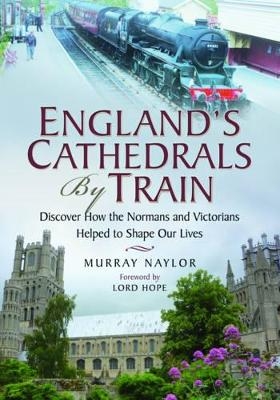
England's Cathedrals by Train
Seiten
2017
Pen & Sword Transport (Verlag)
978-1-5267-0636-2 (ISBN)
Pen & Sword Transport (Verlag)
978-1-5267-0636-2 (ISBN)
- Titel ist leider vergriffen;
keine Neuauflage - Artikel merken
Combines a study of over 30 English cathedrals and the railway systems which allow them to be reached.
One of the jewels in the nation's crown is its Anglican cathedrals. Many, constructed after the invasion of 1066, stand as monuments to the determination and commitment of their Norman builders. Others have been built in later centuries, while some started life as parish churches and were subsequently raised to cathedral status. Places of wonder and beauty, they symbolize the Christian life of the nation and are visited today more than ever, as places that represent England's religious creed, heritage and the skills of their builders. Eight hundred years later came the Victorians, who pioneered the Industrial Revolution and created railways. Like their Norman predecessors, their creations were built to last: the railway system bequeathed to later generations has endured in much the same form as when it was originally constructed and there is certainly little sign that railways will be displaced by other modes of transport in the foreseeable future. Combining a study of thirty-three English cathedrals and the railway systems which allow them to be reached, the author seeks to celebrate these two magnificent institutions.In the process he hopes to encourage others to travel the same journeys as he himself has undertaken.
One of the jewels in the nation's crown is its Anglican cathedrals. Many, constructed after the invasion of 1066, stand as monuments to the determination and commitment of their Norman builders. Others have been built in later centuries, while some started life as parish churches and were subsequently raised to cathedral status. Places of wonder and beauty, they symbolize the Christian life of the nation and are visited today more than ever, as places that represent England's religious creed, heritage and the skills of their builders. Eight hundred years later came the Victorians, who pioneered the Industrial Revolution and created railways. Like their Norman predecessors, their creations were built to last: the railway system bequeathed to later generations has endured in much the same form as when it was originally constructed and there is certainly little sign that railways will be displaced by other modes of transport in the foreseeable future. Combining a study of thirty-three English cathedrals and the railway systems which allow them to be reached, the author seeks to celebrate these two magnificent institutions.In the process he hopes to encourage others to travel the same journeys as he himself has undertaken.
Murray Naylor was born in Cheshire. After school he enlisted in the British Army in which he served for thirty-six years before retiring in 1992. He now lives in North Yorkshire where he occupies himself with a wide range of local activities. He has had a lifelong interest in railways and a more recently developed preoccupation with Englands cathedrals.
| Erscheinungsdatum | 16.02.2018 |
|---|---|
| Zusatzinfo | Integrated with colour |
| Verlagsort | Barnsley |
| Sprache | englisch |
| Maße | 172 x 246 mm |
| Themenwelt | Sachbuch/Ratgeber ► Geschichte / Politik ► Regional- / Landesgeschichte |
| Natur / Technik ► Fahrzeuge / Flugzeuge / Schiffe ► Schienenfahrzeuge | |
| Reisen | |
| ISBN-10 | 1-5267-0636-9 / 1526706369 |
| ISBN-13 | 978-1-5267-0636-2 / 9781526706362 |
| Zustand | Neuware |
| Haben Sie eine Frage zum Produkt? |
Mehr entdecken
aus dem Bereich
aus dem Bereich
die Rhätische Bahn schreibt Geschichte
Buch | Hardcover (2023)
Edition Somedia (Verlag)
CHF 63,90
St. Moritz – Zermatt : die Traumreise im langsamsten Schnellzug der …
Buch | Hardcover (2023)
Verlag Berg & Tal
CHF 25,90
Betriebsmaschinendienst, Einsatz bei den Bahnbetriebswerken und …
Buch | Hardcover (2024)
EK-Verlag
CHF 68,90


